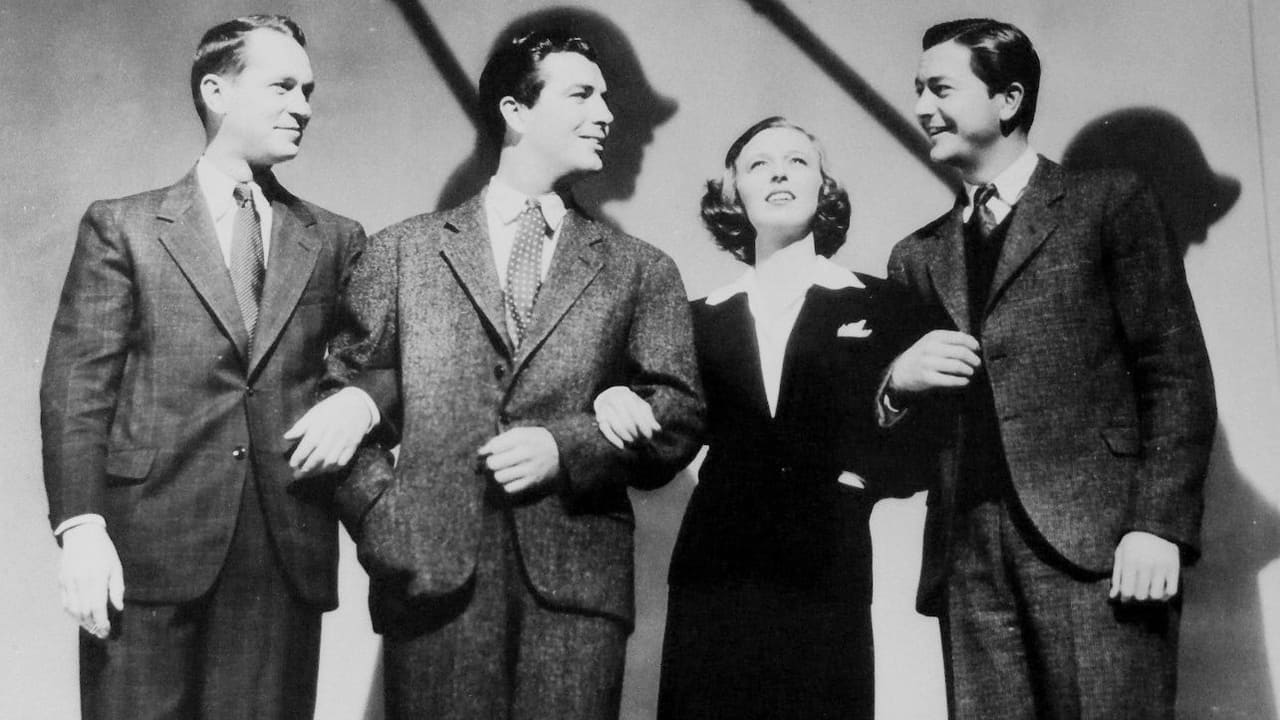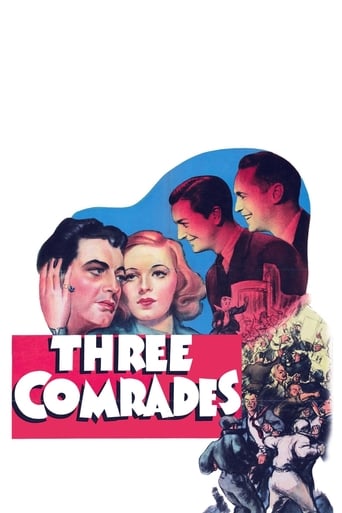

One of the best 10 films of 1938 (according to The New York Times Guide to the Best 1,000 Movies Ever Made), and one which I enjoyed thoroughly when I saw it on TCM.Robert Taylor, Franchot Tone, and Robert Young are the three men who all love Margaret Sullavan (who received her only Oscar nomination) in their own way. Guy Kibbee and Monty Woolley also play roles in this essential drama, as do Henry Hull and Charley Grapewin (who both play doctors; George Zucco also plays one, though he's uncredited). Directed by Frank Borzage, the Erich Maria Remarque novel was adapted by Edward Paramore Jr. and F. Scott Fitzgerald (his only screen writing credit).The three leads (Taylor, Tone, and Young) were soldiers for Germany in World War I and, now that it's over, they become auto mechanics. While out driving their car, they meet Sullavan, who's with Lionel Atwill. Taylor begins dating Sullavan, dining at Kibbee's establishment. But Sullavan is ill, and later needs help from a doctor at a sanitarium (Woolley). All of the drama occurs with a backdrop of an unsettled post war environment.
... View MoreMargaret Sullavan shines in her performance as Patricia Hollman. No wonder she was nominated for an Oscar. She is aided by Robert Taylor, Robert Young and Franchot Tone who finish out the talented cast. They portray 3 WWI buddies that stick together after the war is over and become partners in a Taxi business.Sullavan has such an easy charm about her and never appears to be acting. Her soft, low voice is just mesmerizing to listen to. Taylor, Young and Tone are equally convincing as best friends and genuinely appear to enjoy each others company. Sullavan's character marries Taylor's, but in the bargain gets the other 2 men as close friends.As she becomes ill, they all rally to help her. What woman wouldn't want to be surrounded by 3 men who clearly adore her? The black and white cinematography is adequate. There are times that the studio sets and process shots (driving in car) are very artificial looking, but that is expected from the late 1930's.Overall, this film left me with a good feeling about the value of true friends and true love. One is truly blessed if you can have both.
... View MoreAll the troubles that were brewing in Germany are vaguely realized by MARGARET SULLAVAN, ROBERT TAYLOR, FRANCHOT TONE and ROBERT YOUNG in this film version of Erich Maria Remarque's novel about three comrades and their relationship with a lovely girl.Given the essentials of the plot, which has the girl dying of tuberculosis but wanting to marry the man of her dreams (ROBERT TAYLOR) when urged to do so by one of his comrades (FRANCHOT TONE), there's a tendency for the story to become a bit mawkish and sentimental before it reaches its sad ending.What saves the film from banality are the touching performances of all concerned, especially MARGARET SULLAVAN as the doomed young woman. She is earnest and touching and fully deserved her Academy Award nomination. ROBERT TAYLOR is gentle and sincere as the man she gives her love to.It's directed in leisurely fashion by Frank Borzage and it's slow in the telling, which may discourage fans not too fond of weepies from the '30s era. It holds up pretty well but is nowhere as effective as MGM's THE MORTAL STORM in which Sullavan and Young also participated. That was a much stronger drama dealing more directly with the threat of Nazism, while THREE COMRADES strives only to be a tender romance with the tension of what was to come only implied rather than shown.Trivia note: F. Scott Fitzgerald has one of his rare screen credits as co-author of the screenplay at a time when he was lured to Hollywood but found little success there.
... View MoreThree Comrades, a story of three men and the girl who marries one of them and the bleak future they face in post World War I Germany, is a tender a touching story brought to the screen by some great talents. You can't do too much better than an Erich Maris Remarque novel and a screenplay by none other than F. Scott Fitzgerald. The whole thing is directed by Frank Borzage who is a master at directing tender romances.Erich Maria Remarque is better known for writing All Quiet on the Western Front. That story is about a group of young men who enlist in the German Army in World War I and the illusions that are quickly shattered with military service at the Western Front. Three Comrades essentially picks up where All Quiet on the Western Front leaves off. The characters played by Robert Taylor, Franchot Tone, and Robert Young could easily be those same kids grown up now, three survivors of those who marched to war in 1914-1915.These are working class people who just want to get back to civilian life. They want to go in business together, a car repair garage seems the thing, taking advantage of something useful the military taught them. All react differently to the war. Robert Taylor finds the girl of his dreams in Margaret Sullavan and their love makes them both forget or at least put on the back burner, the horror of World War I. Robert Young is an idealist who still looks for a cause to believe in and finds it in some of the left wing parties of the Weimar Republic. Franchot Tone acts like an older brother figure to both Taylor and Young. He's cynical, but not bitter. He wants a life of peace, but as we see in the film, he's quite capable of using his military training to exact some revenge. Tone's performance in fact is the best in the film.I won't say more, except that for two of the protagonists things end tragically. For which two, buy or rent the film. The Nazis are there also, their movement is just getting started. In 1938 with the Nazis in power in Germany, the audience knew what the two surviving protagonists did not, that their worst fears are realized.As we see the two survivors, accompanied by the ghostly apparitions of their dead comrades, the future is bleak and uncertain. The audience hopes that both survivors are in a place of refuge and peace, as unlikely as that might be.
... View More